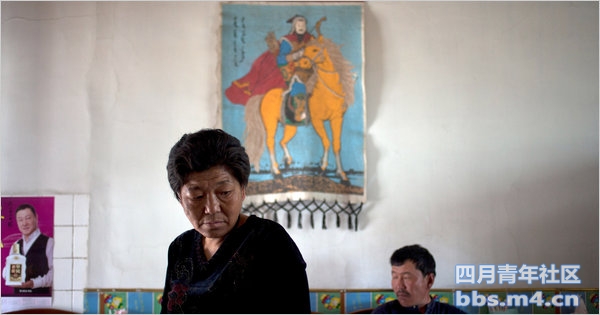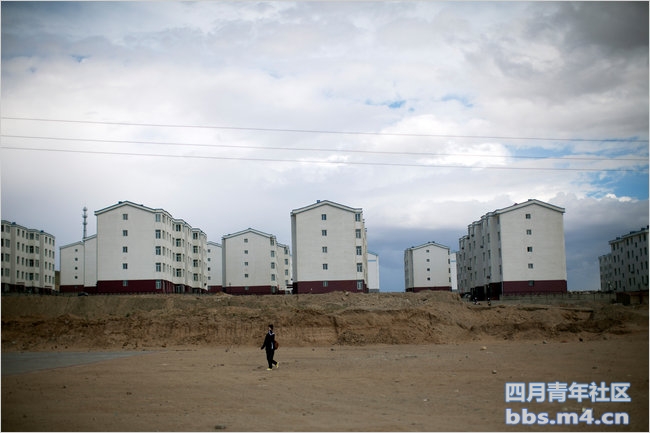【中文标题】中国的民族抗议背后有深厚的历史根源
【原文标题】Ethnic Protests in China Have Lengthy Roots
【登载媒体】纽约时报
【原文作者】ANDREW JACOBS
【原文链接】http://www.nytimes.com/2011/06/11/world/asia/11mongolia.html?ref=china

乌杨说:“没有了牛羊和草地,我们感到无依无靠。”她和她的丈夫索拉图在达茂旗开了一家小餐馆。
在一千年的历史中,纵横在大草原上的蒙古牧民与南方的中国汉人关系一直动荡不安。成吉思汗的马队在1215年占领北京,而清朝军队在4个世纪之后把相同的命运施加给蒙古人。
到了1949年,毛的共党叛逆宣布解放,占领了后来被叫做内蒙古自治区的地带。那里的蒙古人大部分逐渐被汉人的移民、通婚和老式镇压手段所安抚了。
但是,最近几周遍布数个城市的蒙古族抗议活动让人清醒地认识到,政府的慷慨馈赠、同化行为,甚至铁腕政策都不能完全泯灭中国55个少数民族内心的渴望,这些人占据了全国总人口的8%。
即使免受这个国家独生子女政策的限制让蒙古族人口数量就机会逐渐扩大,汉人在内蒙古的数量依然是蒙古族人的5倍。内蒙古这片辽阔的土地面积是加利福尼亚州的两倍,与独立的蒙古国接壤。
一位21岁的计算机专业学生隔着呼和浩特民族大学的围栏对我说:“我感觉我们似乎被汉人淹没了。政府总是说民族和谐政策,但我们为什么感到那么压抑呢?”他和其它几千名蒙古学生在上周被关在学校里5天,以防止他们上街行走。
尽管导致示威行走的是一件肇事逃逸案,5月初一位汉人运煤卡车司机撞死了一位蒙古牧民,但是其背后所隐含的是长久以来的怨恨情绪,这种情绪在我们上周采访的十几位蒙古人身上表露无遗——史无前例的矿产开采热潮破坏了当地的生态结构;经济增长让汉人不成比例地受益,以及快速消失的内蒙古游牧生活传统。

在达茂旗,富裕的牧民都被鼓励搬进公寓楼中。
锡林浩特一个采矿场距离事故现场不远,死者当时与其它一些人试图阻止一辆运煤的卡车通行。5月26日,2000人走上街头,其中大部分是学生。5天后,150名抗议者行进到省会呼和浩特的市中心,现场有数千名士兵和武警,他们把大学生都关闭在校园里。
政府的响应方式与镇压2008年西藏民族大动乱和2009年新疆穆斯林动乱的方式如出一辙。严格限制互联网的使用;大部分蒙古网站被关闭;大量学生、教授和牧民被逮捕。一位流亡的活动人士Enhebatu Togochog说镇压行动是“政治迫害”。
但地方官员也在向一些幕后的司机表达不满,这些人已经表示要纠正采煤过程中的错误行为,包括肆无忌惮地开设露天矿场和卡车压坏草原等行为。政府还承诺将采取更大规模的措施,包括在教育、环境保护和发扬蒙古文化方面投入数亿美元。
在一次鲜见的速战速决审判中——很明显反应出中国领导人对局势进一步动荡的不安,锡林浩特一家法庭在星期三将汉人司机判处死刑,罪名是驾车压死蒙古牧民莫日根。据官方新华社的消息,庭审持续了6个小时,当庭还宣判了其他3名与事件有牵连的男子。当局声称,他们将尽快审理另外一名汉人司机,这位司机被控在事件发生几天之后,两群人在采煤场发生冲突时,用叉车杀死一名示威者。
但是,这些积极的行动是否会平息囤积已久的怒气尚不明朗,尽管内蒙古的经济发展突飞猛进——从2002年开始,内蒙古的经济增长幅度一直居全国各省之首。一些反歧视政策让数万名蒙古族人在政府部门谋得了工作岗位。
卡内基国际和平基金会中国专家、加利福尼亚克莱蒙特-麦肯纳学院的政治教授裴敏欣说:“蒙古的局势让中国领导人寝食难安,因为你不能用钱来解决种族问题。”
在达茂旗——“旗”相当与蒙古的县,十年来,为了恢复草地,让数千名牧民移居到城市中的举措加剧了反zf的情绪。
土地状况恶化的原因是一个值得讨论的问题。尽管很多环境学家说河流上游的大坝、采矿和过度放牧都是其中一部分因素,但政府雄心勃勃的解决方案——被称作“生态移民”——仅关注牧民这一因素。政府为牧民提供财政补贴,条件是他们必须先卖掉自己的牲口。

现在,居住在内蒙古的蒙古人大部分只在特殊的日子里才穿上传统的长袍。
在达茂旗,富裕的牧民都被鼓励搬进郊区的新公寓楼中。这些公寓楼目前大部分依然空置,尽管一旁的公告牌上写着已经有2万人搬进31栋楼中。
那些无力负担新房成本的穷人只能在城里的蒙古区租住狭窄的房屋,那是一片破旧拥挤的砖房。一天下午,一家小餐馆“草原之友”的店主夫妇索拉图和乌杨,告诉我们他们是怎样被迫卖掉自己300头牛、羊、马的牧群。他们说,这样可以得到政府的资助——他们已经上大学的女儿的学费补贴、每年2775美元的生活补助,和可以居住在距离诊所、商店和学校比较近的地点的选择权。
50岁的乌杨(像其他蒙古人一样,她的名字只有一个字)说即使加上他们的小餐馆的收入,这些很快就会到期的津贴也不足以支持这个家庭的开销。还有其它一些模糊的迹象显示,这样的安排不会持续多久。她说:“没有了牛羊和草地,我们感到无依无靠。”她的丈夫眼睛看着地面,猛吸香烟。“我们发现自己已经不适合生活在这个城市中,但是我们被骗了。”
一个致力于保护内蒙古草原的组织“曾经草原”的负责人陈继群说,生态移民所起到的作用是值得怀疑的。例如,一片健康的草原要依赖食草动物群把粪便踩进土壤中,“否则,粪便干燥后就会被风吹走,土地就会缺少肥料。”
联合国特别报告人Olivier De Schutter在去年12月的一份报告《食物权利》中,谴责中国的牧民安置政策,说它过于强制,并且会导致“贫穷加剧、环境退化和社会结构断裂。”
但是,内蒙古专家Christopher P. Atwood在研究了牧民团体的瓦解过程之后,说生态移民只不过加速了不可避免的人口结构变化。过去二十年里不断下降的牲畜价格和农村发展窘况,让越来越多的年轻蒙古人转移到汉族占据的市中心去生活。
布卢明顿印第安纳大学的中亚研究学会主席Atwood先生说:“农村社会是蒙古文化和语言的集中所在地,破坏农村社会对种族身份的延续有最直接的影响。”
这样的结果是,去蒙古语学校中读书的学生比例在逐年降低,从80年代开始,这个数字已经下降了一半,到目前40%的水平。这样的变化大部分原因在于那些牧民思想的转变,比如38岁的黄丽英,她开着一家小商店,13岁的女儿在500英里外的工业城市包头的一家汉语学校中读书。黄女士说:“要想在现在的世界上成功地生活,你需要讲流利的汉语。女儿不说民族语言让我觉得很遗憾,但是只要离开大草原,蒙古语就没有什么用处了。”
即使政府并非蒙古语言和文化逐渐消亡的罪魁祸首,但是很多参加上周示威活动的人,把他们的愤怒都发泄在统治内蒙古的汉人身上。他们抱怨越来越多的跨族通婚和对当地网站的封锁,甚至对有些招牌上蒙古文字比汉语文字稍小也表示不满。
不仅是学生们怀有这种怨气。在上周与警察几次令人不快的对抗中,一位蒙古官员悄悄走进一个陌生人,坦承了他令人瞠目结舌的内心想法。他说希望自己也有勇气加入到行走队伍中,他面带一种阴谋得逞的诡异微笑表情,说:“我感受到愤怒就来自我自己的血液中。”
原文:
“We feel lost without our herds and the grassland,” said Uyung, left, with her husband, Suyaltu, at the small canteen they run in a town in Damao Banner, China.
DAMAO BANNER, China — The Mongol nomads who have ranged across these blustery grasslands for millenniums have long had a tempestuous relationship with their Han Chinese neighbors to the south. Genghis Khan’s horseback conquerors overran Beijing in 1215, and Qing dynasty armies returned the favor four centuries later.
By the time Mao’s Communist rebels declared victory in 1949, the Mongolians who occupied what became the Inner Mongolia Autonomous Region of China had been by and large pacified through Han immigration, intermarriage and old-fashioned repression.
But the ethnic Mongolian protests that have swept a number of cities in recent weeks are a sobering reminder that government largess, assimilation or an iron fist cannot entirely extinguish the yearnings of some of China’s 55 ethnic minorities, who account for 8 percent of the country’s population.
Even as an exemption from the nation’s one-child policy granted to minorities helped expand their numbers, Mongolians are still outnumbered by Han five to one in Inner Mongolia, a region twice the size of California that borders the independent nation of Mongolia.
“We feel like we are being drowned by the Han,” said a 21-year-old computer science student, speaking through the fence of Hohhot Nationality University, where he and thousands of other Mongolian students were penned up for five days last week to prevent them from taking to the streets. “The government always talks about ethnic harmony, but why do we feel so oppressed?”
Although the immediate trigger of the demonstrations was a hit-and-run accident in which a Han coal truck driver struck and killed a Mongolian herder in early May, the underlying enmity can be tied to longstanding grievances that spilled out during interviews with more than a dozen Mongolians last week: the ecological destruction wrought by an unprecedented mining boom, a perception that economic growth disproportionately benefits the Han and the rapid disappearance of Inner Mongolia’s pastoral tradition.
In Damao, former herders with money are encouraged to move into new apartment blocks.
In Xilinhot, a mining hub not far from where the herder was killed as he and others tried to block a convoy of coal trucks, as many as 2,000 people, many of them students, took to the streets on May 26. Five days later, about 150 protesters marched through the center of Hohhot, the regional capital, despite the presence of thousands of soldiers and paramilitary police officers who kept college students confined to their campuses.
The government response has hewed closely to the recipe used to quell the far more violent ethnic turmoil that convulsed Tibet in 2008 and the predominantly Muslim region of Xinjiang a year later. Internet access has been severely restricted, with most Mongolian Web sites shut down, and scores of students, professors and herders have been taken into custody. Enhebatu Togochog, an exiled human rights advocate, has described the crackdown as a “witch hunt.”
But officials have also sought to address some of the underlying drivers of the discontent. They have vowed to correct abuses of the coal industry, among them unregulated strip mining and trucks that career over the fragile steppe. The government has also committed to broader changes, promising hundreds of millions of dollars for education, environmental protection and the promotion of Mongolian culture.
And in an unusually prompt trial — apparently a reflection of Chinese leaders’ fears of further unrest — a Xilinhot court on Wednesday handed down a death sentence to the Han driver convicted of running down Mergen, the Mongolian herdsman. The trial, which lasted six hours, according to the official Xinhua news agency, also yielded stiff sentences for three other men involved in the episode. The authorities said they planned to quickly try another Han driver accused of killing an activist with a forklift during a confrontation between the two groups at a coal mine several days later.
But it is unclear if the swift action will still resentments that have simmered despite Inner Mongolia’s fast-expanding economy — the growth rate has topped that of all other provinces since 2002 — and affirmative action policies that have provided tens of thousands of government jobs to ethnic Mongolians.
“The Mongolian situation is very worrying for the Chinese leadership because you can’t just throw money at an issue like ethnic identity,” said Minxin Pei, a China expert at the Carnegie Endowment for International Peace and professor of political science at Claremont McKenna College in California.
Here in Damao Banner — banner being the Mongolian equivalent of a county — a decade-long effort to restore grasslands to health by moving thousands of shepherds into towns and cities has helped fuel antigovernment sentiment.
The reasons for the land’s decline are a matter of some debate, although many environmentalists say the damming of waterways, coal mining and overgrazing all play a role. But the government’s most ambitious solution, known as ecological migration, focuses solely on the herdsmen, providing subsidies to them — but only after they have sold off their flocks.
Mongolians in Inner Mongolia largely wear traditional robes only on special occasions now.
In Damao, those with money are encouraged to move into new apartment blocks on the outskirts of town. For now, they appear largely vacant, although a billboard near the entrance claims that 20,000 people have already moved into the 31 buildings.
Those too poor to buy new homes rent cramped rooms in the town’s Mongolian quarter, a grim, densely packed cluster of brick buildings. On a recent afternoon, Suyaltu and Uyung, the husband-and-wife proprietors of a small canteen called Friend of the Grassland, explained how they were forced to sell their pasture and a herd of 300 cows, sheep and horses in 2004. There are perks to the program, they said: subsidized school fees for their college-age daughter, a $2,775 annual subsidy and the advantages of living near medical clinics, shops and schools.
Still, Uyung, 50, who like many Mongolians goes by a single name, said that even when combined with the income from their restaurant, their soon-to-expire subsidy was not enough to sustain the family. Then there are other, less tangible downsides to the arrangement. “We feel lost without our herds and the grassland,” she said as her husband looked at his feet and dragged on a cigarette. “We discovered we are not suited to the city, but now we are stuck.”
Chen Jiqun, director of Echoing Steppe, an organization that works to protect Inner Mongolia’s grasslands, said the benefits of ecological migration were questionable. For one, he said, a healthy pasture depends on the hooves of grazing animals to grind up manure. “Otherwise it just blows away and the land loses its fertility,” he said.
In a report issued last December, the United Nations Special Rapporteur on the Right to Food, Olivier De Schutter, criticized China’s nomad resettlement policies as overly coercive and said they led to “increased poverty, environmental degradation and social breakdown.”
But Christopher P. Atwood, an expert on Inner Mongolia who has studied the disintegration of herding communities, said ecological migration was merely accelerating the inevitable demographic shift brought on by two decades of sagging livestock prices and the rural stagnation that drove young Mongolians to the region’s Han-dominated urban centers.
“Rural communities are the stronghold of Mongolian culture and language, so breaking them up has a direct impact on ethnic identity,” said Mr. Atwood, chairman of Central Eurasian Studies at Indiana University, Bloomington.
The result has been a steady decline in the proportion of students who attend Mongolian-language schools, a figure that has dropped by nearly half, to 40 percent, since the 1980s. The shift has largely been propelled by former herders like Huang Liying, 38, a shop owner whose 13-year-old daughter studies at a Mandarin-language school in Baotou, an industrial city 500 miles away. “To be successful in the modern world you need to speak good Chinese,” Ms. Huang said. “I feel regret she doesn’t speak her mother tongue, but Mongolian is not very useful beyond the grassland.”
Even if the government is not directly responsible for the ebb of Mongolian language and culture, many of those who joined the protests last week directed their ire at the Han officials who run the show in Inner Mongolia. They complained about increasing intermarriage, the heavy-handed censorship of local Web sites and the fact that Mongolian script on street signs is sometimes rendered smaller than the adjacent Chinese characters.
Such sentiments are not confined to students. During one of several unwelcome confrontations with the police last week, a Mongolian officer in Damao sidled up to a stranger and made a startling confession. He said he wished he had been brave enough to join the protests. “The anger I feel,” he said with a conspiratorial grin, “is burning through my veins.”
|